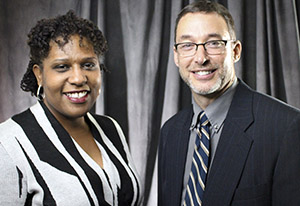Nicole Coleman and Jonathan Schwartz Receive $10,000 Grant
 As racial tensions grow between police officers and citizens, common ground can be hard to find. However, two researchers at the University of Houston College of Education are working to get at the root of the divide.
As racial tensions grow between police officers and citizens, common ground can be hard to find. However, two researchers at the University of Houston College of Education are working to get at the root of the divide.
Nicole Coleman, associate professor of counseling psychology, and Jonathan Schwartz, associate dean of graduate studies received a grant from the American Psychological Association to help generate strategies aimed at reducing racial bias in policing.
“It’s important to note that bias is not unique to police officers, but the consequence of unaddressed bias in police can mean the difference between life and death,” Schwartz said.
One issue at play involves implicit bias, where a person’s behavior or attitude toward another is automatic and subconscious based on factors such as race. Studies have shown that implicit bias contributes to undeserved suspicions and actions toward some cultures while others are presumed innocent.
“Since bias occurs on a conscious and unconscious basis with real-world implications, it is important to have informed interventions that work,” Schwartz said. “Our goal is to get beyond a dialogue for common understanding to create action steps to directly address racial bias in policing.”
Coleman and Schwartz pulled together professionals from multiple disciplines to find ways to influence policy regarding police training in implicit bias. “There is an increasing amount of societal tension regarding race and racism,” Coleman said. “Unfortunately, this is acted out through police-community interactions that are frequently discriminatory and, though far less frequently, disturbingly violent.”
Specifically, Coleman and Schwartz recently traveled to Washington, D.C., to lay the groundwork to guide future policy and systemic changes. They met with a wide-ranging group that included experts who assist with training and providing mental health services to police officers; activists in the Black Lives Matter movement; and representatives from the American Psychological Association.
The $10,000 grant helped fund the travel.
“It was a wholly invigorating and inspiring day,” Coleman said. “We were not all on the same page, given our various backgrounds, but we were all committed to the bigger cause. Dr. Schwartz and I walked away with new perspectives and ideas that would not have come about without those critical and pivotal discussions.”
Recent events, including a wave of police shootings and the divisive presidential election in November, have had a direct impact on the nation’s racial climate.
“We hope our work helps to engage police forces and communities of color in positive, culturally-appropriate ways to help facilitate more respectful and cooperative interactions,” Coleman said.